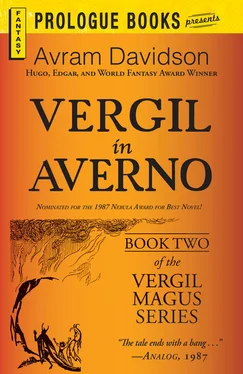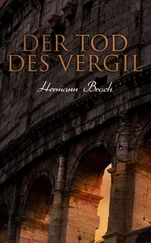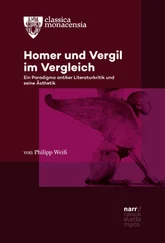Avram Davidson - Vergil in Averno
Здесь есть возможность читать онлайн «Avram Davidson - Vergil in Averno» весь текст электронной книги совершенно бесплатно (целиком полную версию без сокращений). В некоторых случаях можно слушать аудио, скачать через торрент в формате fb2 и присутствует краткое содержание. Жанр: Фэнтези, на английском языке. Описание произведения, (предисловие) а так же отзывы посетителей доступны на портале библиотеки ЛибКат.
- Название:Vergil in Averno
- Автор:
- Жанр:
- Год:неизвестен
- ISBN:нет данных
- Рейтинг книги:3 / 5. Голосов: 1
-
Избранное:Добавить в избранное
- Отзывы:
-
Ваша оценка:
- 60
- 1
- 2
- 3
- 4
- 5
Vergil in Averno: краткое содержание, описание и аннотация
Предлагаем к чтению аннотацию, описание, краткое содержание или предисловие (зависит от того, что написал сам автор книги «Vergil in Averno»). Если вы не нашли необходимую информацию о книге — напишите в комментариях, мы постараемся отыскать её.
Vergil in Averno — читать онлайн бесплатно полную книгу (весь текст) целиком
Ниже представлен текст книги, разбитый по страницам. Система сохранения места последней прочитанной страницы, позволяет с удобством читать онлайн бесплатно книгу «Vergil in Averno», без необходимости каждый раз заново искать на чём Вы остановились. Поставьте закладку, и сможете в любой момент перейти на страницу, на которой закончили чтение.
Интервал:
Закладка:
The eunuch began to rise. He rose and rose and still he was rising, he was on his feet, hands pushing away from desk as he began to straighten up, and still it was not over. The eunuch was not eunuch-fat, that was mostly myth; the man was eunuch-tall, it was no myth, he was far closer to seven feet tall than to merely six. And as he stretched to his full height he said, in a rich and ringing voice, “The King!” All about, the tambours beat, and Cadmus entered with a train of state. The gaze was steady and the color clear. He was not mad today. He was not mad at all.
The robes and the chains of linked medallions worn by some of those who had come in with Cadmus would have led Vergil at once to assume, had this all been elsewhere, that such men were members of a greater or a lesser Grand Council of some municipium, or leaders of guilds, if not both. But in Averno there was no Grand Council, lesser or greater, there were only the magnates; there were not even any guilds. The power of the magnates covered the ground, and they and it allowed no room for anything else. . not even for the Lousepickers’ Guild as mentioned in the graffito at the tiny tavern in the port town where Vergil had first met Armin. Thought before thinking caused Vergil’s eyes to scan the group: yes. Armin was there. And very grave and dignified he looked, too. And he too wore a robe and chain. . as though holding office, though there was, in Averno, no such office he could hold. And then, Vergil and Rano standing side by side, still, though no longer face to face, Cadmus came close up to them. His clear eyes considered Vergil, but he did not change expression. What he had to say was to be said to another.
“Rano. Magnate. Man Hear Our Royal will. We have consulted. We have advised and been advised. Very soon We intend to speak with Our Liege, the Emperor; meanwhile, thus it is: All born here, and all held to service or labor here for the space of twenty year, are to be citizens of here. The benefits, and all the benefits, of Citizens of Rome, Rano, are to be holden. . here. . by such citizens of Averno. And all those thus worn by labor are to receive bread, Rano, for they are men, Rano. And when you and all your fellow-magnates have assented, Rano. . magnate. . man. . then we shall speak again and further, Rano. Meanwhile, and at once, Rano: Let it be done.”
He turned and he went down the ladder, the steps, and the ramp, and along the long passageway that led to the warehouse’s outer door.
Meanwhile all the trumpets sounded and all the tambours beat.
Rano looked, after some long bemusement, once again at Vergil. Whatever had been in his eyes and in his mouth before was not there. His face moved, though. His mouth moved. His manner showed neither secret confidence nor anger, not even scorn. It did not even show amazement. “You see?” he said. “You hear? You …” Words failed him. One word, next, did not. “Mad,” he said, shaking his head. “Mad, mad, mad, mad, mad …”
Although it might seem that Averno was inhabited chiefly by masters and slaves, with many of the masters themselves once-slaves; as well as a surly rabble depending perhaps less on their daily dole of rather bad bread (with SPQR roughly indented on it just before baking). . and this only if, rabble or not, they were Roman citizens. . than on either employment of a sort small different from outright theft, or on outright theft itself. — Still, in Averno, there were other sorts of people, of the sorts found elsewhere, almost every elsewhere. There were merchants, physicians, astrologers, superior craftsmen who produced detailed work (jewelers, blind or sighted, for example) such as the workshops of Averno’s magnates did not know. If there were no architects, if there were but a few who might be termed engineers in that they worked in such crude engines as the regular work of Averno need must have: presses, stamps, drills, looms, or what; if there were no painters, hardly, not counting those who spread white lime on walls with vast brushes or, often, merely mops; still, still, from the world outside Averno — how! was there still a world outside Averno? more than once, thus, Vergil bethought himself — came some small and unsteady influx of such arts as, principally, aliens denizened in Averno might desire.
So one day, he having chosen to go alone some short way on what proved to be a bootless errand, strolling idly (idle was his stroll, but not his mind) back to his apartments, he heard the familiar sounds of a trio of music sounding the sort of strains which advertise that a troop of traveling players is about to begin its show; to listen was to look, and so, rounding a corner — a process that occupied all his attentions, lest he slip on the stepping-stones and bemire himself in the filth and sludge — at last he lifted his eyes. Flute and lute and cymbals ceased almost at that moment, and prepared to go within whatever rented room was to be their theater. . and where, no doubt, they would also play. . one of them sounding a last call to the “citizens and residents and visitors in the Very Rich City who are very welcome to pay the most modest of prices and enter here to attend at The Great Play of Troy. …” A woman, one of two, cast an eye at him ere she and her companion and the musics, all, turned and went in. He followed.
Such cheap and popular theater, if it did not take too long, often amused him, if (as often) for no other reason than the immense difference between the classical readings from Homer and the bawdy buffoonery, half-improvised at the best, usually interlarded with such popular allusions as had most lately been thrust into the script. Several considerations worked at his mind; one was that his mind might well be the better for some little rest from the restless chores with which he had been so deeply engaged; other considerations? For some reason, and he could just then say no more than some, the woman who had looked at him reminded him of a very curious story being told about Simon Magus and the woman whom he called (was said to call) Helen of Tyre. . or of Troy. Third and last of the considerations was that there had been that something in this one’s look at him, before she turned and went inside, which had more in it than the mere automatic look at any man as any man has had more than once from any such a woman, half a strolling player and half a whore. Or did he flatter himself? Did he or did he not, in he went, the price was indeed very modest and he paid for three seats in order that he might be free of perhaps unwanted, say unpleasant, company in the seats to right or left.
The play itself was nothing. Mingled with lines from Homer such as not alone every schoolboy knew but many who had never been inside a schoolroom, and lines introduced now and then rather less because the play required them as to allow those who knew them to show they knew by reciting them half-aloud along with the actors; mingled with those were abridgments of entire scenes compressed into a paragraph; now and then touches for the popular taste, if “taste” was quite the word, such as an obsequious actor, if actor was quite the word, declaiming, “O Hail Great King Priam! Great and glorious art thou, O King! I tell that thou art indeed a god!” At which time see “King Priam” make his eyes grow large, rise from his throne, extract from beneath it a vessel of an obvious utility, scan it closely, and respond, “That’s not what me night-pot tells me!”
Raucous laughter from the cheapest seats, chuckles from the others, though ancient (and, indeed, rather honorable) the jest. . jest now repeated with appreciation. . many people could not at all appreciate a jest in silence (most, Vergil recalled, with an inner sigh, could not even read in silence; his own, to some, arcane, ability to do so had more than once been remarked upon).
Читать дальшеИнтервал:
Закладка:
Похожие книги на «Vergil in Averno»
Представляем Вашему вниманию похожие книги на «Vergil in Averno» списком для выбора. Мы отобрали схожую по названию и смыслу литературу в надежде предоставить читателям больше вариантов отыскать новые, интересные, ещё непрочитанные произведения.
Обсуждение, отзывы о книге «Vergil in Averno» и просто собственные мнения читателей. Оставьте ваши комментарии, напишите, что Вы думаете о произведении, его смысле или главных героях. Укажите что конкретно понравилось, а что нет, и почему Вы так считаете.












